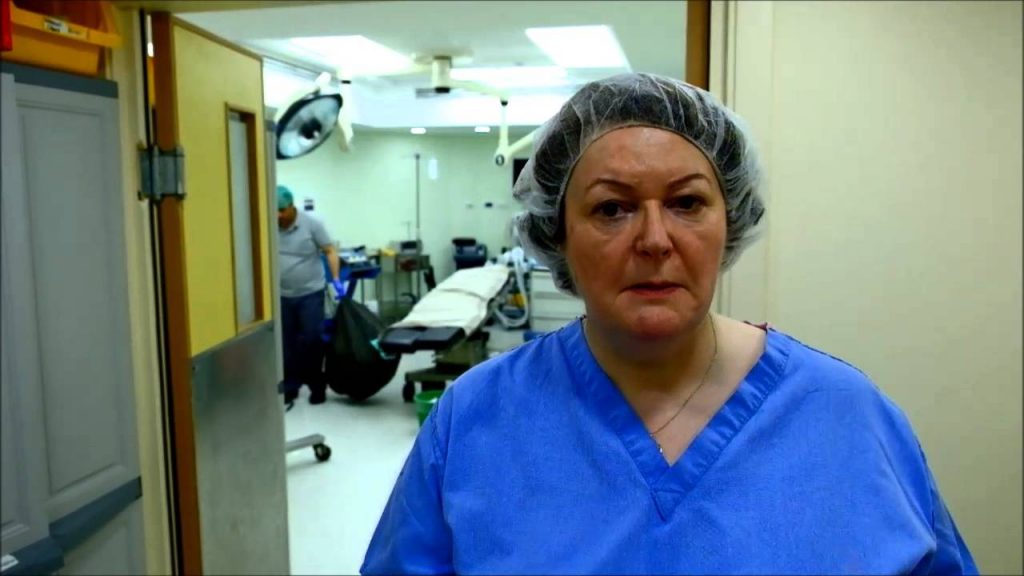#CripTheVoteUK: The Politics of the ‘Other’ – By Dr Philippa Whitford MP (SNP) NHS Consultant Breast Cancer Surgeon:
“I cannot believe that so many people across the UK are planning to vote for such a hard, uncaring Tory Government – and that so many others will simply stand back and not vote at all.”
Dr Philippa Whitford writes exclusively for Black Triangle Campaign and UK disabled people everywhere . . .

Published Monday 29th May 2017
By NHS Consultant Breast Surgeon and SNP Member of Parliament for Central Ayrshire Dr Philippa Whitford MP
Over the last seven years of Tory-dominated rule at Westminster we have witnessed a relentless pandering to the politics of ‘The Other’ with differences in country of origin, colour or religion, exploited to create a scapegoat for the financial state of the UK and put the blame on anyone except the bankers who gambled away people’s savings and pensions.
They have used Victorian language to recreate the concept of the ‘deserving’ and ‘undeserving’ poor – with almost everyone put in the latter category.
The recent Tory manifesto launch showed that Mrs May was so arrogantly confident of a ‘landslide’ in June that she felt she could afford to attack everyone, from infants to pensioners.
This has let society see the harsh disregard of the Tory Government for their citizen’s, but attacks on those most in need have been underway since 2010.
There have been two major Welfare Reform Acts passed in just five years with money taken away from supporting the most vulnerable in our society and that cost passed to Devolved Governments, Local Authorities, Charities and individuals.
The Scottish Government has spent £396m over the last five years mitigating cuts, such as the ‘Bedroom Tax’, at a time when the Scottish Budget itself has been cut by nearly £3Bn.
The Welfare cuts alone remove a further £2Bn from the Scottish economy, as people who are struggling to put food on the table spend less in their local economy.
The Welfare changes hit many groups, including lone parents and their children, single women pensioners and in particular, disabled people.
The two Acts have brought in a series of benefit cuts that represent a basic change in philosophy.
The principle of pooled ‘Social Security’ is dead and it is a case of grovel for a handout or ‘Devil take the hindmost’.
This is illustrated by the Tory plans on social care which aim to throw the costs back onto the individual.
 So much rhetoric in the House of Commons has been about separating those who are powerful and comfortably off from everyone else and allowing them to feel smug that they are among the ‘workers, not shirkers’ and ‘strivers not skivers’
So much rhetoric in the House of Commons has been about separating those who are powerful and comfortably off from everyone else and allowing them to feel smug that they are among the ‘workers, not shirkers’ and ‘strivers not skivers’
BASED on disability, economic activity or wealth, people have been classed as worthless drags on the state and the precious ‘Taxpayer’.
The thing is that we are taxpayers too.
Having worked as a surgeon for 33 years, I am well aware that life can change utterly in a heartbeat – something that the wealthy and smug seem to forget.
One in five people have a disability and, while a small number are unfortunate to be born with a congenital condition 83% acquire ill-health and/or disability throughout their lives as they get older.
This means that the complacency of those who rant against support for disabled people is totally misplaced – one day they may find themselves on the wrong side of the current round of cuts in support.
The litany of direct cuts to disabled people’s support includes limiting Employment Support Allowance (ESA) for the ‘Work Related Activity Group’ (WRAG) to one year in 2012 – and then removing it completely this April, 2017.
These are people who have been found unfit for work but it is ‘hoped’ they will recover and they are therefore asked to prepare for that through training – with sanctions if they fail to ‘comply’.
Removing the WRAG component has cut their income by almost £30 per week and reduced it to be the same as Jobseekers Allowance:
‘This cut discounts the additional costs, such as heating, transport or hospital parking charges, faced by someone suffering from an intermittent condition, such as MS or mental illness, or those recovering from life threatening illness such as cancer, trauma, or major surgery.’
One of the biggest changes has been the change from Disability Living Allowance (DLA) to Personal Independence Payments (PIP).
The latter is meant to help with the fact that living costs for those with a disability are 25% higher due to extra transport costs, the need for special diets or equipment and increased fuel bills as they often spend more time at home.
Despite the Westminster Tory Government’s declared aim of halving the Disability Employment Gap which currently stands at 32% – they have made it much more difficult for disabled people to get work by using the reassessment regime to move half of those on the higher level of DLA to the lower rate of PIP; meaning over 400,000 fewer applicants qualify for Motability vehicles.
This has so far resulted in over 50,000 disabled people losing their mobility vehicles and scooters to date. All have been removed immediately, without even waiting for the appeal process, making it much harder to seek help or even attend the appeal. This is due to the new assessment criteria in PIP reducing the qualifying walking distance from ‘less than 50 metres’ to less than 20. This is the sort of distance one might have to walk from the car park to a supermarket, it certainly does not allow people to walk to a bus stop.
Transport difficulties are one of the major contributors to difficulties in getting a job so this removal of basic support is self-defeating. Surveys also reveal that it is leading to isolation for many disabled people: Tory MPs, supposedly supporting the Jo Cox Foundation campaign against loneliness, are utterly hypocritical while they are causing disabled people to become housebound.
We know that loneliness contributes to mental ill-health but the loss of mobility support is causing increased isolation with disabled people stuck in their homes.
Physical and mental illness can be inextricably linked but PIP doesn’t seem to recognise this and certainly doesn’t seem to support those with mental ill-health despite all the Conservative Government’s parroting of ‘Parity of Esteem‘.
 I HAD a constituent who suffered from complex PTSD and depression who was initially transferred from DLA to the higher rate of PIP.
I HAD a constituent who suffered from complex PTSD and depression who was initially transferred from DLA to the higher rate of PIP.
Last year he was reduced to the lower rate and, on appeal, actually had his remaining benefit removed – leaving him in a state of shock and despair.
When my team contacted the DWP advice hotline for MPs they were told that PIP was really for the most severely disabled who could not carry out basic tasks of daily life or had mobility issues.
It was suggested that this did not apply to those with Mental Health issues as clearly they could cook and wash themselves – so could really just get on and work.
 Clearly, the words of someone who has never seen a patient with severe depression, looking like the batteries have been taken out as they struggle to face even the simplest of tasks.
Clearly, the words of someone who has never seen a patient with severe depression, looking like the batteries have been taken out as they struggle to face even the simplest of tasks.
I have taken his case to the Secretary of State to challenge this callous and dismissive approach and I am hoping to get his benefits reinstated but what kind of training is being given to DWP staff in the first place to engender such an attitude?
PIP is meant to cover the extra costs of living with a disability, without means testing and regardless of whether one is working or studying, but applicants report comments that suggest assessors think someone who can work or study should not be entitled to support with the number being given no points having doubled to approximately 200,000 a year.
While two-thirds of cases are overturned at Tribunal, less than a quarter of decisions are reversed at the earlier stage of Mandatory Reconsideration.
This lengthens the whole process and reduces the likelihood of the applicant taking the case to Tribunal.
Everything is set as a barrier and, particularly for those with learning difficulties or severe mental health problems, these barriers can seem insurmountable and make it less likely they will challenge the decisions taken.
The other development in 2012 was, of course the widespread use of punitive sanctions, not just for JSA claimants who were not felt to be trying hard enough to find a job, in the midst of a recession, but also for those who were put on ESA WRAG.
Sanctions, enacted for all sorts of reasons, without taking account of explanations or extenuating circumstances, have been one of the main drivers of Food Bank use in the UK which has soared since 2010.
This coupled with all the gaps and delays when a benefit is applied for, or someone is changed from one to another, is leaving vulnerable people with periods of 6 weeks or more without any income for food, fuel or rent.
(See: http://www.disabilitynewsservice.com/tag/paul-donnachie/ ~ Black Triangle)
One of the Governments biggest failings is that, while they have carried out some impact assessments on individual changes, they have refused to carry out a cumulative impact assessment of their cuts to see how all the changes add up and could leave someone destitute.
It must be remembered that disabled people are also hit by many of the other welfare cuts as they have a four times greater chance of being unemployed or in very low paid jobs.
As being classed as disabled gives some protection from the Benefit Cap, losing that through the aggressive reassessment of those on DLA or PIP means there can be a domino effect with them losing other financial support too.
Then, there are the repeated reassessment of disabled or ill people despite them having a permanent disability or incurable condition.
This is causing incredible personal stress and fear as well as an unjustified waste of time and money.

One of my first cases as an MP was a lady I had looked after in my former role as a Breast Cancer Surgeon who had been turned down for Disability Living Allowance. To be fair, her completion of the complex form did not give a clear idea of the extent of her ongoing health problems but they should have been obvious at her assessment.
Instead, she was told that, as she had made it to the appointment she could clearly get out and work – despite the fact that she had spent a considerable sum on a taxi to get there as failure to attend would also have seen her lose benefits.
As I knew her case well, I was able to help get her financial support reinstated, though it took some time and was very stressful for her:
After this she was told she would not need any further assessments – yet a mere three months later, the appointment letter for reassessment and transfer to PIP landed on her mat.
What have we become in the 21st century that we are happy to put all the burden of the UK’s debt on the backs of some the most vulnerable people in our society?
With all the faults of the current assessment system, it is totally ridiculous to think that a work coach, who is not even carrying out a formal assessment, can ensure that a sick or disabled person can safely carry out work-related activity prior to their Work Capability Assessment.
The DWP should employ sufficient staff to assess people’s conditions and eligibility for support.
Perhaps if they spent less time relentlessly re-assessing people with incurable conditions, they might be able to get new claimants assessed in a reasonable time frame.
I particularly fear this approach being taken to those suffering with mental ill-health as an untrained work coach is simply not equipped to judge what they can and cannot do.
They spout platitudes about ‘parity of esteem’ but it is not borne out by any of their actions.
Their persecution of those living with the detriment of disability is unacceptable – the only safe way is to wait until a formal assessment can be carried out.
I cannot believe that so many people across the UK are planning to vote for such a hard, uncaring Tory Government and that so many others will simply stand back and not vote at all.
Since the EU referendum last year, I have had to listen to Tory MPs eulogising about a return to Britain’s glory days and there has been talk about Empire 2.0
Let’s remember those were the days where there was no NHS and no Social Security.

